Dallisgrass vs. Crabgrass: Which Weed is In Your Lawn?
When you want to have a perfect lawn, weeds are your biggest enemy.
They can be tall and leggy and stand above your regular grass, almost mocking it. And they always ruin the look of your well-manicured lawn, taking away from the overall pretty, enjoyable landscape you desire.
And this is the case even with weeds that look like grass. Why? Because you can see there’s a weird difference in your lawn between the regular lawn and weeds. Something is off – whether it’s the color, height, texture, or overall appearance. You can just see the lack of consistency.
Two of the worst offenders like this in Maryland lawns are dallisgrass and crabgrass. Both are grassy weeds that sneak into your lawns and look almost like grass. And both can be tough to control.
Let’s talk about how you can tell the difference between dallisgrass and crabgrass so you can better identify and control your lawn weed problem and get back to enjoying a weed-free lawn.
The Main Differences Between Dallisgrass vs. Crabgrass
Grassy weeds are pretty annoying, and you probably just want them all gone.
But knowing the unique attributes of each weed can help you better target and control them.
Use This Lawn Weed ID Tool to Spot Weeds in Your Lawn
While weeds may look like each other or they may look like your lawn, there are actually quite a few differences between them. Take crabgrass vs. dallisgrass, for instance. When they are both thriving in your Maryland lawn, you can easily mistake one for the other. There are actually quite a few distinctions between the two.
Height
First, to tell the difference between dallisgrass vs. crabgrass, you’ll want to look at their height.
Dallisgrass is the taller of the two weeds. It also stands more upright.
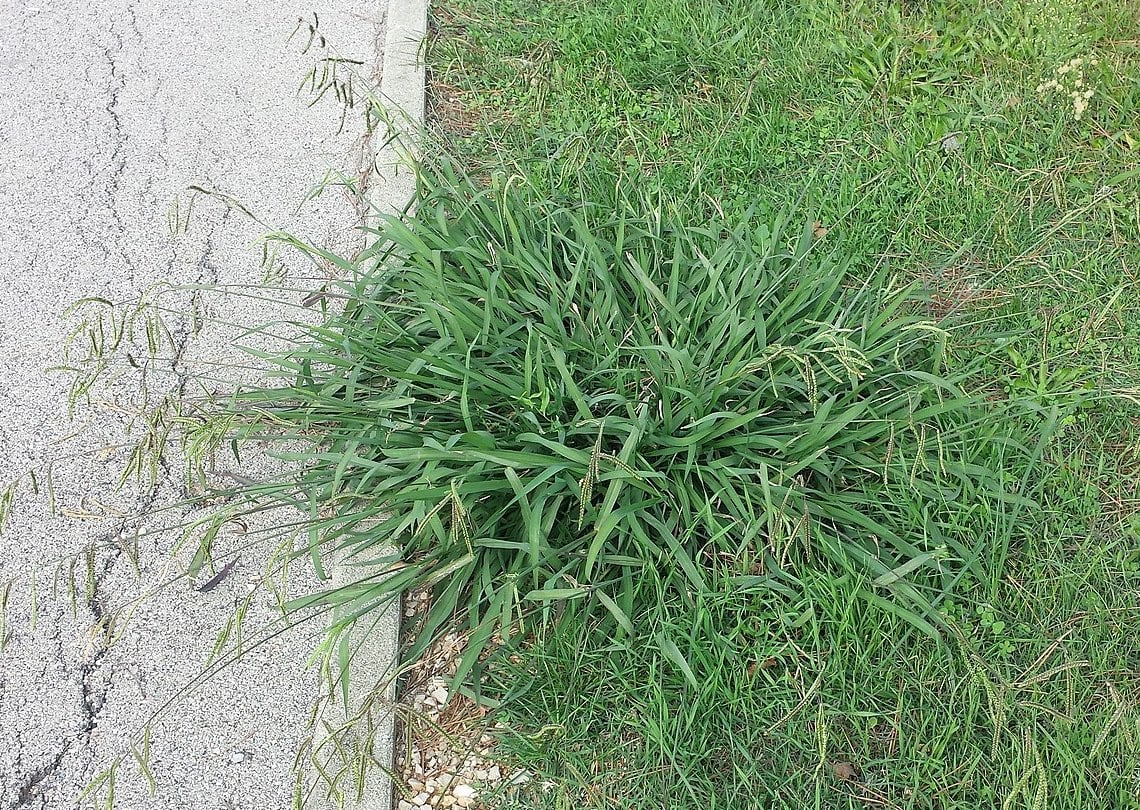 Crabgrass has broader leaves and grows lower to the ground.
Crabgrass has broader leaves and grows lower to the ground.
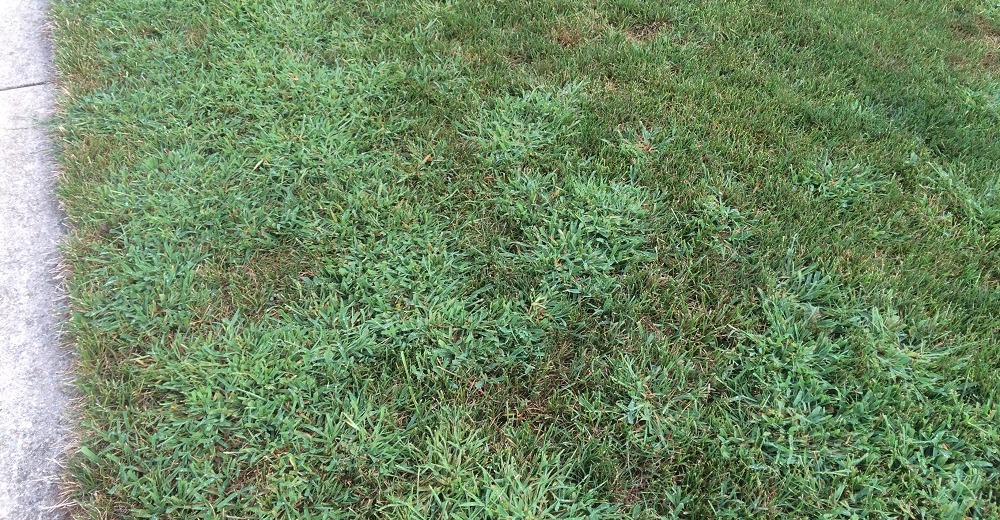
Seed Head
These two weeds also differ by the appearance of their seed heads. You’ll know you have dallisgrass or crabgrass if you study them closely.
Crabgrass seed heads are pretty small and very fine. They grow out of the top of crabgrass stems.
Dallisgrass seed heads, on the other hand, are much larger. They also have small black spots on them, growing off the sides of the stems.
Growth Habit
When you’re trying to tell whether you have dallisgrass or crabgrass in your lawn, you will also find the two weeds grow in unique ways.
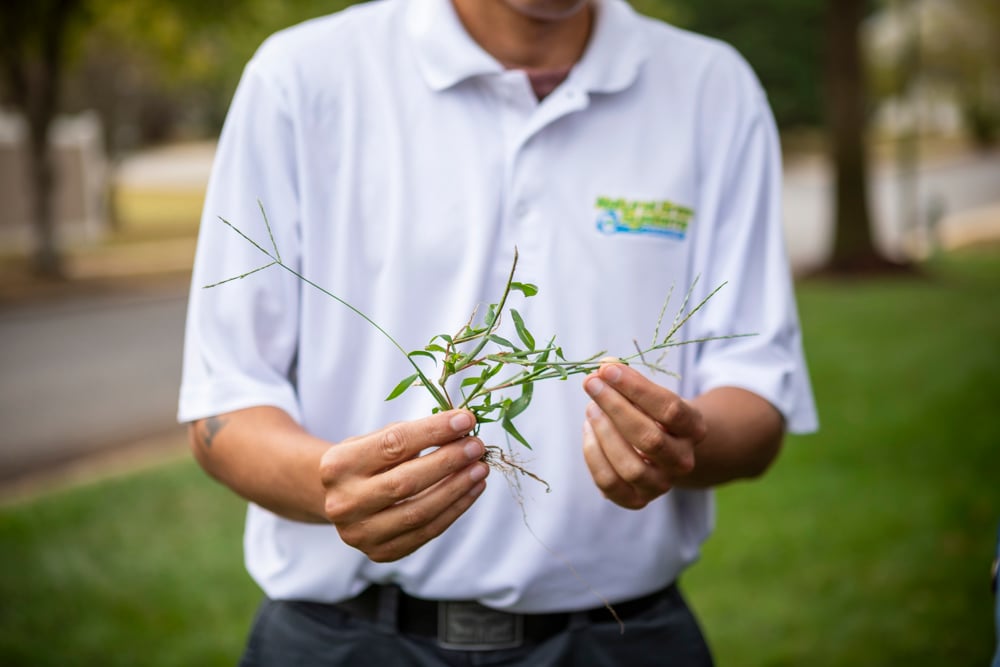
Dallisgrass grows and regrows from clumps and sods and seeds. Crabgrass, on the other hand, produces tens of thousands of seeds to give it a great chance to grow each year.
Color
You’ll notice a slight difference in color between dallisgrass vs. crabgrass as well.
Crabgrass will be more of a bluish green, while dallisgrass will grow in more of a pale green shade.
Annual vs. Perennial
The biggest difference between dallisgrass vs. crabgrass is that dallisgrass is a perennial that grows back each year from the same root system, while crabgrass is an annual that germinates from seeds and dies within the same year.
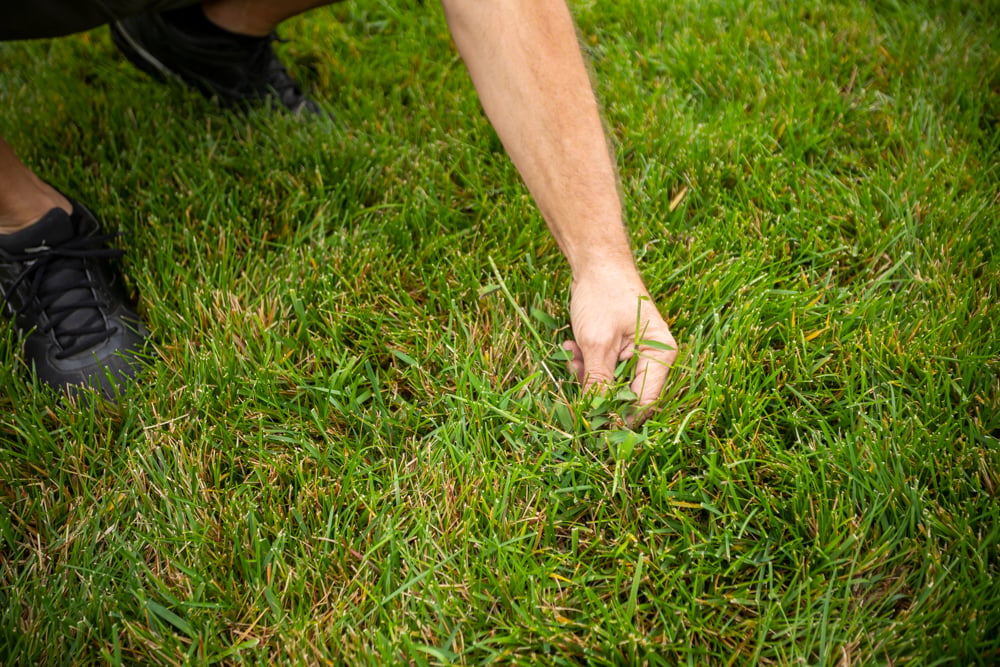 Dallisgrass appears as solid, circular clumps, while crabgrass can spread in a pointed, widening pattern, kind of like fireworks.
Dallisgrass appears as solid, circular clumps, while crabgrass can spread in a pointed, widening pattern, kind of like fireworks.
Controlling Dallisgrass vs. Crabgrass
Yep, you guessed it: There are even different ways to control crabgrass vs. dallisgrass.
Crabgrass is ideally controlled early in the season with a pre-emergent herbicide before the seeds have a chance to germinate and the weed begins growing and spreading. Using two applications during the prime window will help capture more of the seeds that are present and waiting to germinate.
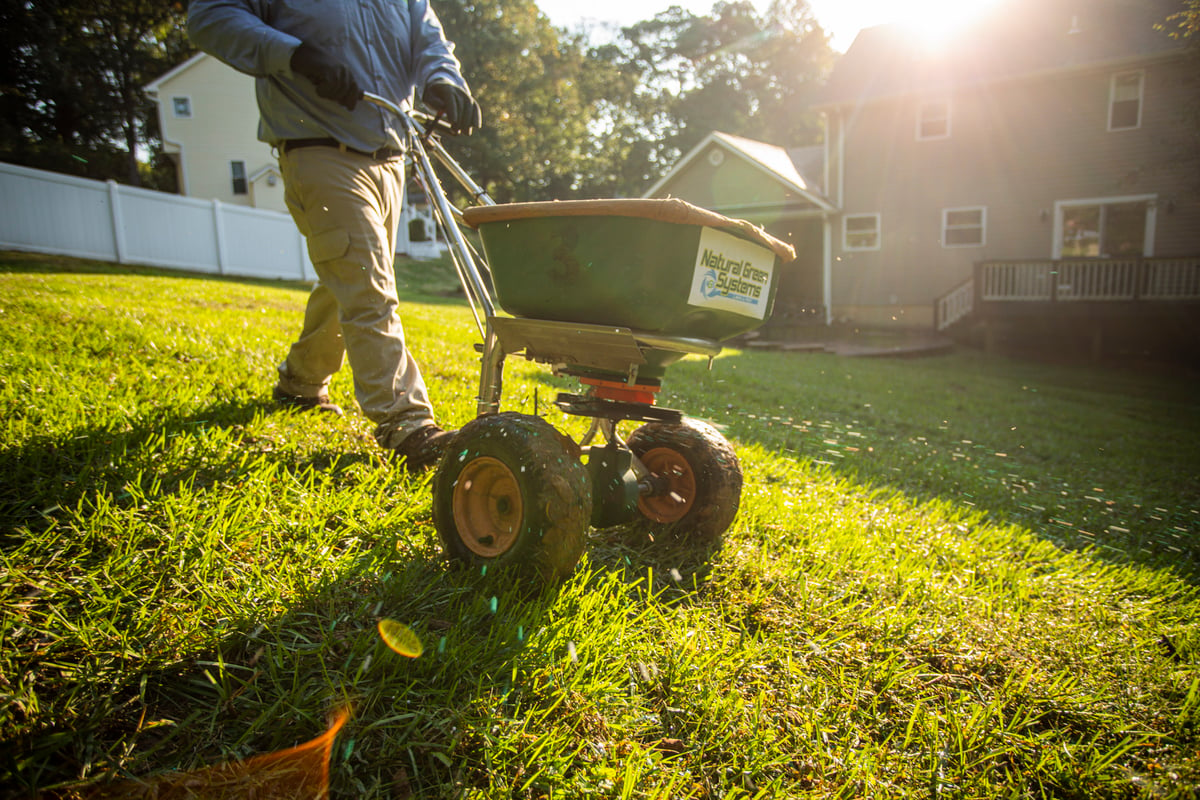 Unfortunately, with dallisgrass, pre-emergents are not effective. Using a selective herbicide will usually require two applications or dallisgrass will continue getting worse.
Unfortunately, with dallisgrass, pre-emergents are not effective. Using a selective herbicide will usually require two applications or dallisgrass will continue getting worse.
Whichever Weed You Have, It’s Time to Get Rid of It
You want to be outside playing fetch with your dog and enjoying time with your children. You don’t want to be wasting time staring at weeds that continue to take over your Maryland lawn.
While you try to distinguish whether you think it’s dallisgrass or crabgrass that is wreaking havoc on your lawn, you might become pretty confused trying to tell the difference.
And that’s OK. Natural Green can help. We can tell which weed is which and get down to business taking care of it in your lawn so you can worry more about fun and less about these problems in your grass. That’s what summer is all about, after all.
We want you to enjoy your yard. Give us a call today and we’ll bring our proven dallisgrass and crabgrass control experience and create a custom plan for your Central and Southern Maryland lawn. Get started today with a free quote.
Image Source: Dallisgrass
Dallisgrass grows and regrows from clumps and sods and seeds. Crabgrass, on the other hand, produces tens of thousands of seeds to give it a great chance to grow each year.
Color
You’ll notice a slight difference in color between dallisgrass vs. crabgrass as well.
Crabgrass will be more of a bluish green, while dallisgrass will grow in more of a pale green shade.
Annual vs. Perennial
The biggest difference between dallisgrass vs. crabgrass is that dallisgrass is a perennial that grows back each year from the same root system, while crabgrass is an annual that germinates from seeds and dies within the same year.
 Dallisgrass appears as solid, circular clumps, while crabgrass can spread in a pointed, widening pattern, kind of like fireworks.
Dallisgrass appears as solid, circular clumps, while crabgrass can spread in a pointed, widening pattern, kind of like fireworks.
Controlling Dallisgrass vs. Crabgrass
Yep, you guessed it: There are even different ways to control crabgrass vs. dallisgrass.
Crabgrass is ideally controlled early in the season with a pre-emergent herbicide before the seeds have a chance to germinate and the weed begins growing and spreading. Using two applications during the prime window will help capture more of the seeds that are present and waiting to germinate.
 Unfortunately, with dallisgrass, pre-emergents are not effective. Using a selective herbicide will usually require two applications or dallisgrass will continue getting worse.
Unfortunately, with dallisgrass, pre-emergents are not effective. Using a selective herbicide will usually require two applications or dallisgrass will continue getting worse.
Whichever Weed You Have, It’s Time to Get Rid of It
You want to be outside playing fetch with your dog and enjoying time with your children. You don’t want to be wasting time staring at weeds that continue to take over your Maryland lawn.
While you try to distinguish whether you think it’s dallisgrass or crabgrass that is wreaking havoc on your lawn, you might become pretty confused trying to tell the difference.
And that’s OK. Natural Green can help. We can tell which weed is which and get down to business taking care of it in your lawn so you can worry more about fun and less about these problems in your grass. That’s what summer is all about, after all.
We want you to enjoy your yard. Give us a call today and we’ll bring our proven dallisgrass and crabgrass control experience and create a custom plan for your Central and Southern Maryland lawn. Get started today with a free quote.
Image Source: Dallisgrass
When you want to have a perfect lawn, weeds are your biggest enemy.
They can be tall and leggy and stand above your regular grass, almost mocking it. And they always ruin the look of your well-manicured lawn, taking away from the overall pretty, enjoyable landscape you desire.
And this is the case even with weeds that look like grass. Why? Because you can see there’s a weird difference in your lawn between the regular lawn and weeds. Something is off – whether it’s the color, height, texture, or overall appearance. You can just see the lack of consistency.
Two of the worst offenders like this in Maryland lawns are dallisgrass and crabgrass. Both are grassy weeds that sneak into your lawns and look almost like grass. And both can be tough to control.
Let’s talk about how you can tell the difference between dallisgrass and crabgrass so you can better identify and control your lawn weed problem and get back to enjoying a weed-free lawn.
The Main Differences Between Dallisgrass vs. Crabgrass
Grassy weeds are pretty annoying, and you probably just want them all gone.
But knowing the unique attributes of each weed can help you better target and control them.
Use This Lawn Weed ID Tool to Spot Weeds in Your Lawn
While weeds may look like each other or they may look like your lawn, there are actually quite a few differences between them. Take crabgrass vs. dallisgrass, for instance. When they are both thriving in your Maryland lawn, you can easily mistake one for the other. There are actually quite a few distinctions between the two.
Height
First, to tell the difference between dallisgrass vs. crabgrass, you’ll want to look at their height.
Dallisgrass is the taller of the two weeds. It also stands more upright.
 Crabgrass has broader leaves and grows lower to the ground.
Crabgrass has broader leaves and grows lower to the ground.

Seed Head
These two weeds also differ by the appearance of their seed heads. You’ll know you have dallisgrass or crabgrass if you study them closely.
Crabgrass seed heads are pretty small and very fine. They grow out of the top of crabgrass stems.
Dallisgrass seed heads, on the other hand, are much larger. They also have small black spots on them, growing off the sides of the stems.
Growth Habit
When you’re trying to tell whether you have dallisgrass or crabgrass in your lawn, you will also find the two weeds grow in unique ways.

Dallisgrass grows and regrows from clumps and sods and seeds. Crabgrass, on the other hand, produces tens of thousands of seeds to give it a great chance to grow each year.
Color
You’ll notice a slight difference in color between dallisgrass vs. crabgrass as well.
Crabgrass will be more of a bluish green, while dallisgrass will grow in more of a pale green shade.
Annual vs. Perennial
The biggest difference between dallisgrass vs. crabgrass is that dallisgrass is a perennial that grows back each year from the same root system, while crabgrass is an annual that germinates from seeds and dies within the same year.
 Dallisgrass appears as solid, circular clumps, while crabgrass can spread in a pointed, widening pattern, kind of like fireworks.
Dallisgrass appears as solid, circular clumps, while crabgrass can spread in a pointed, widening pattern, kind of like fireworks.
Controlling Dallisgrass vs. Crabgrass
Yep, you guessed it: There are even different ways to control crabgrass vs. dallisgrass.
Crabgrass is ideally controlled early in the season with a pre-emergent herbicide before the seeds have a chance to germinate and the weed begins growing and spreading. Using two applications during the prime window will help capture more of the seeds that are present and waiting to germinate.
 Unfortunately, with dallisgrass, pre-emergents are not effective. Using a selective herbicide will usually require two applications or dallisgrass will continue getting worse.
Unfortunately, with dallisgrass, pre-emergents are not effective. Using a selective herbicide will usually require two applications or dallisgrass will continue getting worse.
Whichever Weed You Have, It’s Time to Get Rid of It
You want to be outside playing fetch with your dog and enjoying time with your children. You don’t want to be wasting time staring at weeds that continue to take over your Maryland lawn.
While you try to distinguish whether you think it’s dallisgrass or crabgrass that is wreaking havoc on your lawn, you might become pretty confused trying to tell the difference.
And that’s OK. Natural Green can help. We can tell which weed is which and get down to business taking care of it in your lawn so you can worry more about fun and less about these problems in your grass. That’s what summer is all about, after all.
We want you to enjoy your yard. Give us a call today and we’ll bring our proven dallisgrass and crabgrass control experience and create a custom plan for your Central and Southern Maryland lawn. Get started today with a free quote.
Image Source: Dallisgrass


